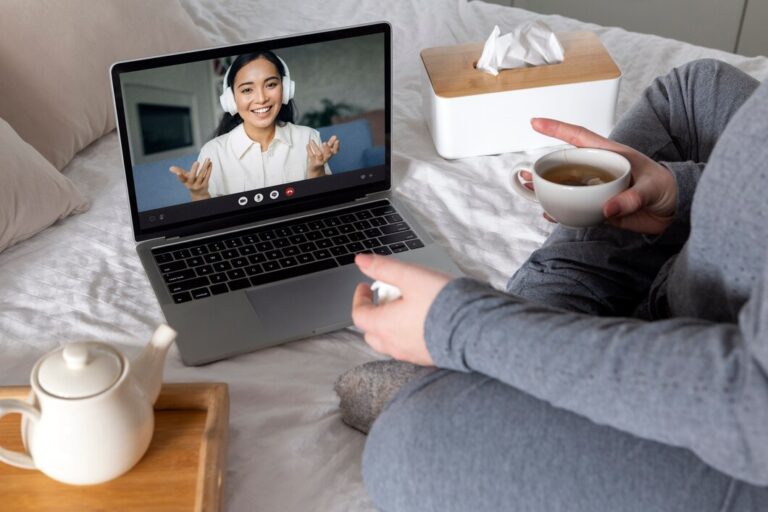Disclaimer: My content is NOT a substitute for professional advice, diagnosis, or treatment. When in doubt, ask a therapist!
Teletherapy is virtual therapy, whether it’s done via video, phone, or text message.
A four-year study of 96,609 American mental health patients shows that teletherapy is even more effective than in-person therapy in decreasing the need for hospitalization and the days of being in the hospital if admitted.
Another study involving 2,384 Americans showed that teletherapy was just as effective in reducing symptoms of depression and improving quality of life as compared to in-person care.
But here’s the question: Does teletherapy work for social anxiety?
Yes!
According to a meta-analysis of 20 studies, internet-based cognitive-behavioral therapy (ICBT) is equally effective. And, more importantly…
- There’s no difference in dropout rates between in-person and ICBT
- The benefits of ICBT were also sustained during 6 and 12 months follow-up
👉 Guide: Cognitive behavior therapy (CBT) for social anxiety
Now, let’s look at the pros and cons of teletherapy for social anxiety:
Advantages
- Usually cheaper than in-person therapy
- Saves time, since you don’t have to travel (especially helpful if you’re in a rural/remote location)
- It is a good start for people who are too anxious to attend face-to-face therapy.
Iffah, M.Couns., comments:
“The plus of teletherapy for social anxiety should not be downplayed because it is a way for socially anxious people to start connecting, and it allows for gradual exposure.”
Disadvantages
- No in-person guidance, which can be helpful when doing exposure therapy
(Iffah comments: “Then again, we can practice grounding/mindfulness techniques by ourselves once we’ve learned them!”) - You might find it more difficult to connect or focus in therapy sessions
- The therapist might find it hard to notice any physical symptoms of social anxiety disorder (if your entire body isn’t visible in the video)
- Time zone differences can be a challenge (if your therapist is in a different country)
Video, phone, or text?

No one medium is significantly better than the rest. (And, to my knowledge, there hasn’t been a study that directly compares the effects of video vs. phone vs. text in teletherapy.)
That being said, it can be helpful to understand the benefits and limitations of each medium. See below:
| Medium | Pros | Cons |
| Video |
|
|
| Phone |
|
|
| Text |
|
|
Sources: Chen et. al., Dwyer et. al.
Teletherapy activities for social anxiety
Most therapy activities that are effective for social anxiety can be done virtually.
Here’s a list of them:
- Cognitive behavior therapy (CBT) for social anxiety
- Acceptance and Commitment Therapy (ACT) for social anxiety
- Does mindfulness help social anxiety? Yes (here’s how)
- What’s the best meditation for social anxiety?
- 31 social anxiety exposure challenges
How to find a teletherapist
Tsung Wai, MD, is the founder of TeleHope Health, a telemental health platform, and he sits on our editorial board. Here’s his advice:

1. Consider the type of help you need, as well as the severity of your condition. There's a variety of therapists, ranging from social workers to counselors and clinical psychologists. (I'd suggest looking for well-trained and licensed therapists, with a minimum of a Master's degree in Counseling or Clinical Psychology.) 2. Ask yourself the following questions: a) Do I need to be diagnosed during the treatment process? If you do, you would need to seek out a clinical psychologist as they can provide you with an assessment for diagnosing mental health illnesses. b) Would I prefer a more structured approach to my treatment? It’s a rule of thumb, but clinical psychologists tend to adhere to structured types of therapy and counselors are more eclectic with their approach. c) Do I have other concerns beyond social anxiety? You can always talk to both clinical psychologists or counselors about anything, but counselors tend to have more experience with issues such as job counseling, couples therapy, etc. that they might be able to better address on your therapeutic journey.
Shortlisted teletherapy platforms
Here are a few popular teletherapy platforms that work with licensed therapists:
- Talkspace: video or video + text, $69-99/week
- 7 Cups: text only, $150/month
- Aloe Mind: video, ~$35-47/session
- TeleHope Health: video, ~$25-43/session (Malaysia only)
What about therapy chatbots?
There’s some preliminary evidence that shows the promise of therapy chatbots. In a study, the severity of both panic disorder and social anxiety was decreased after four weeks of using a chatbot app.
So which chatbot should you try? While I haven’t found one that specializes in social anxiety, it can be worth giving Woebot a shot, as the app has been tested in a few clinical trials. See APA’s review here.
Disclaimer: Note that chatbot apps are unregulated and there are risks of following their advice!

